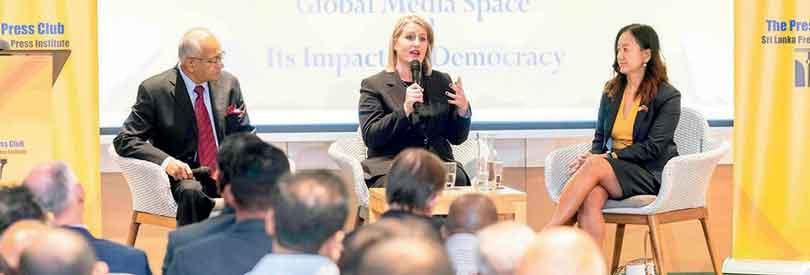Reply To:
Name - Reply Comment

Ms. Allen (middle) speaking at the panel discussion alongside US Ambassador to Sri Lanka Julie Chung (right)
Image courtesy : Sri Lanka Press Institute
 In January 2024, the Parliament of Sri Lanka passed another draconian law titled the “Online Safety Act” (OSA), which many stakeholders claim is an attempt to further suppress Media Freedom and the Freedom of Expression.
In January 2024, the Parliament of Sri Lanka passed another draconian law titled the “Online Safety Act” (OSA), which many stakeholders claim is an attempt to further suppress Media Freedom and the Freedom of Expression.
US Undersecretary of State for Public Diplomacy and Public Affairs, Elizabeth Allen, during her recent visit to Sri Lanka, acknowledged journalists’ commitment to seek the Truth even amidst a challenging era, at a Press Club event organized by the Sri Lanka
Press Institute.
Ms. Allen elaborated on how the global media space supports Democracy and fosters peaceful, just and inclusive societies. The United States stands firmly for the Freedom of Expression, advocating for Press Freedom both online and offline, and ensuring the safety of journalists and media workers worldwide.
In her comments regarding the Online Safety Act which the Sri Lankan Parliament rushed in without having adequate consultations with stakeholders, Allen further said that the United States voiced concerns over its potential effects on the Freedom of Expression, innovation, and privacy.
“It’s common to hear arguments against unfettered Freedom of Expression. Critics claim the media is biased, aiming to embarrass governments and undermine public trust. Others worry that without checks, the Freedom of Expression may fuel the spread of misinformation. Some argue that an unchecked press can incite tension and compromise security. And there’s concern that continuous reports on corruption, violence and political strife can tarnish a nation’s image, deterring investment and hampering development. However, the media’s bias should lean towards the public’s interest, acting as a guardian to ensure that leaders fulfil their duties. This principle holds in Sri Lanka, the United States and globally.”
She attributed challenges of the negative press, often labelled as “fake news” or “biased journalism” sprouting from heated exchanges between politicians and journalists, especially when leaders feel their actions are misrepresented, leading to accusations of inaccuracies and biased reporting.
The challenge of negative press, often labelled as “fake news” or “biased journalism” is not new. For generations, governments and the media have navigated a complex, sometimes adversarial relationship. This dynamic isn’t unique to any one nation; in the United States, for instance, Presidents from both major political parties have experienced their share of friction with the press. This tension, a hallmark of democratic societies, plays a crucial role in fostering transparency and encouraging effective governance. It’s a familiar scene: politicians and journalists engage in heated exchanges, especially when leaders feel their actions are misrepresented, leading to accusations of inaccuracies and biased reporting.
“The duty of the press is to deliver facts as they stand, shedding light on the government’s achievements as well as spotlighting areas where policies or programs fall short.”
AI in Public Diplomacy
During the Q&A session, Ms. Allen spoke about the pros and cons of including AI in public diplomacy. “There’s a lot of fear involved with AI. That fear is rightfully founded, particularly given the power of AI in the information space when it comes to inauthentic content, manipulated content and things like deep-fakes. Of course, misinformation, disinformation etc., are foremost challenges of AI. However, the US is working with allies and partners around the world to see how these risks could be managed to for example pursue the technological vision to authenticate content created by AI. But AI also brings about an enormous amount of opportunities in public diplomacy and strategic communications.”
Concerns Regarding the Online Safety Act
Speaking further about the OSA, Ms. Allen said that the US does share concerns of journalists, influencers and content creators on the potential of repression on the Freedom of Expression and the stifling of dissent that the OSA looks to face. “We’re encouraged by the amendments process, and we have been offered an opportunity to give our feedback and we have done so. We do share the concerns of technology companies in terms of their ability to operate in Sri Lanka freely. Everybody sees the digital economy as a tool to help Sri Lanka’s economic future and attract investments while preserve the Freedom of Expression.”
She further said that given the reservations on the anti-terror bill and other laws, the conversations around such legislations can be contemplated. “I have a lot of empathy for journalists operating in the current environment, given the powers of the Online Safety Act. Keep going with the fortitude to know that you’re providing a service to society and making institutions stronger. I have been told about the technical challenges faced by journalists including the fact that sources are afraid to work with you. I believe that it’s important to raise the profile of challenges faced by journalists as a matter of democratic concern.”
Adding her comments, US Ambassador to Sri Lanka, Julie Chung said that there are threefold concerns with regards to the OSA. “These include the process, intent and implementation. The process didn’t take many extensive input and suggestions from a variety of stakeholders. It is supposedly intended to combat pornography and attacks on women and children, but there are broad definitions which are concerning. In terms of implementation we’re yet to see how it is going to be implemented.”
She further said that concerns regarding the Online Safety Act have not just been raised by the US and the international community, but tech experts, civil society, the private sector, lawyers’ groups and journalists’ groups have been the most vocal. “I would encourage those in government to not just listen to the US or the international community but also listen to the voices of its own citizens,” she underscored.